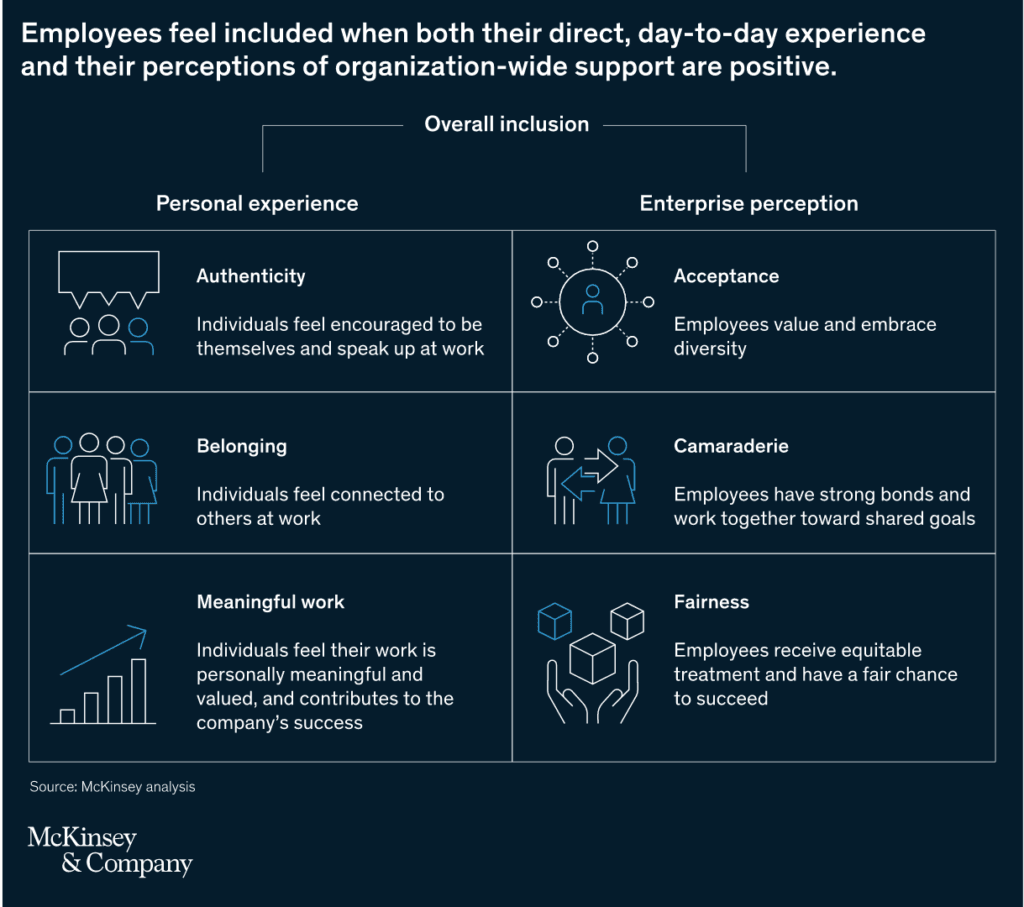Inclusion and diversity are critical for business recovery, resilience and re-imagination in a post-covid world.
What Does Diversity, Equity and Inclusion Look Like at Work?
Let’s define diversity. Diversity refers to the mix of people in an organisation—that is all the differences between people in how they identify in relation to their social identity. What do we mean? We’re talking about their background, their age. Are they Aboriginal or Torres Strait Islander? What is their cultural background? Do they have any disabilities? What is their gender, their religious affiliation, or sexual orientation and also their socio-economic background? But, diversity is not only about personal or social identity. It also includes a person’s professional identity. What is their current profession? What is their education and work experience? What is their organisational levels and functional areas of responsibility and also in what location within an organisation do they work?
These aspects come together in a unique way for each individual and shape the way they view and perceive their world and workplace, as well as how others view and perceive and treat them as well.
Let’s look at defining inclusion. Inclusion refers to getting the mix of people in an organisation to work together and improve performance and well-being. Inclusion in a workplace is achieved when there is diversity of people, that is, people of all different ages, cultures, backgrounds genders and perspectives, and they all feel that they are being respected for who they are and are able to be themselves. They feel connected to their colleagues and they feel they belong where they are as well. They also feel that they are contributing and their perspectives and their talents are being accepted within the organisation, and it’s being perceived as being valuable as well. And lastly, they feel that they are progressing in their career and at work, and most importantly, that they have equal access to opportunities and resources within an organisation.
Why is Diversity and Inclusion in the Workplace Important?
Research has shown that there are many benefits of diverse and inclusive workplace practices and workplace cultures. Some of these benefits include higher revenue growth, greater readiness to innovate and increased ability to recruit a diverse talent pool.

The Four Cornerstones of Diversity
The first one is knowledge – going out and educating yourself and informing yourself around diversity. What is diversity?
Speaking to your colleagues and friends that share different cultural backgrounds to yourself, visiting their restaurants, visiting maybe their churches, mosques or temples, going to cultural activities, cultural events and festivals, putting yourself in a position where you can educate and inform yourself a lot better about what diversity is and how different people relate to different scenarios and different events and how that then relates to your workplace.
The second cornerstone is understanding. Once you have some sort of knowledge about diverse backgrounds, you put that knowledge into action. If you understand why a person is acting in a particular way, it may be easier for you to empathise with them. So, it involves having knowledge and then applying that knowledge.
The third cornerstone is acceptance. What is acceptance?
Acceptance doesn’t mean that you have to adopt the behaviours or the rituals of a culture that’s not your own. It also doesn’t mean condoning behaviours that clash with your value system. Acceptance does mean respecting the values and the behaviours of other cultures.
Let’s say that we need to schedule a team meeting and I feel that the best time to do that is before our work starts, so maybe at 8 am every morning. However, one of our colleagues has conflict with that because they have to attend their prayer session in the morning before work, and maybe I don’t do that practice, that’s not a practice of mine. So, what can I do to show respect to that colleague and team member? Instead of asking them to change their prayer times, I might look at scheduling the meeting for another time. That way I’m accepting of her different background and different culture, and I’m adapting to make that work for her and for the team as a whole.
Developing acceptance can open up a whole range of possibilities for everyone involved. You can start to open up your mind and you can probably learn something new about your colleague and also about a different culture. When you have these different viewpoints that are exchanged in a respectful manner, amazing ideas are bound to result from that. This is respectful and healthy exchange, and communication obviously results in a better and stronger team as well.
The fourth cornerstone is behaviour. Now that all the pieces are in place, you can look more closely at your behaviour. Say for example, you were to have Friday lunches and the lunches included meat pizzas and beers, but you have a team member that doesn’t drink or maybe doesn’t eat meat because they are vegan, what do you do?
It’s that changing of behaviour that allows you to accept the cultures and also to understand them a lot better, and that comes from increasing your knowledge.
So as you can see, the four cornerstones of diversity allow for cohesion within an organisation, and it allows a mutual exchange of respect between team members. This leads to better productivity and, certainly, better results and better outcomes for your organisation.
The Inclusion Model
Created by consulting firm, McKinsey and Co., the Inclusion Model covers two key employee elements:
Personal experience captures how employees individually experience belonging, whether they feel encouraged to bring their full potential authentic selves to work and how empowered they are to make meaningful contributions.
Enterprise perception captures how employees view the strength of acceptance, camaraderie and fairness across the full enterprise.

This diagram illustrates that strong diversity, equity and inclusion policies are really necessary, but not sufficient to foster inclusion in an ever-changing world of business.
One of the key drivers of success is people, as the world becomes a global village, you’ll have more people in the organisation that come from different backgrounds, religions and countries. Harnessing and fusing ideas and experiences from this diverse team of workers is a huge boost to your business and is a key determinant of your business’ success.

Great article. Meaningful a lot!